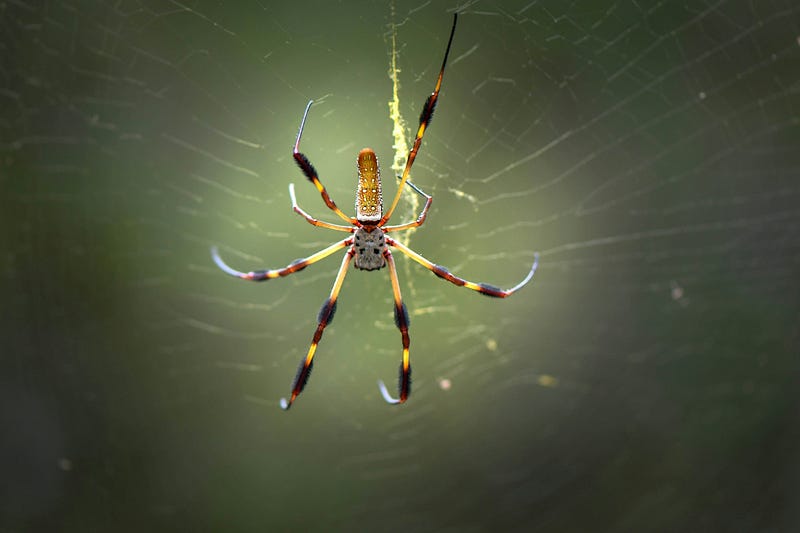Embracing the Unloved: The Essential Role of Spiders in Nature
Written on
Chapter 1: An Unlikely Admiration
I have developed a fondness for species often deemed undesirable, such as spiders, snakes, bats, and sharks. This admiration didn’t come overnight; it evolved gradually. While I often attribute it to my fascination with shark week during my middle school days, there was another pivotal moment that truly ignited my interest.
At age 16, I turned down a dusty, narrow road to visit friends at a blueberry farm. After a 15-minute drive, kicking up dust and gravel, I arrived at a grassy area that served as a parking lot. Beyond it, just past a low wooden fence, were rows of tall blueberry bushes, towering over me, perfectly aligned like lines on a sheet of notebook paper. In front of this field stood my friend's house—owned by her parents.
I exited my car and made my way to the entrance of the farm to join my friends. After exchanging greetings and discussing our drives for a bit, my friend's father arrived. With a messy brown and gray ponytail fluttering in the breeze, he looked every bit the outdoorsy type, clad in well-worn hiking pants, sandals, and a Zion National Park t-shirt.
Without delay, he laid down two rules: the first was not to pick more blueberries than we could consume, which was fair since we weren’t paying customers. The second rule, however, took me by surprise. He instructed us never to harm a spider on the property under any circumstances. His serious tone felt pointed at me, perhaps because I had a history of being a persistent spider eliminator. This was the first time I paused to reflect on my previous actions.
After confirming the rules, my friends and I set out to gather blueberries, although my focus quickly shifted to the spiders around us. I became curious about their significance to the farm and started exploring the bushes, searching for their delicate webs.
My quest was fruitful; I found large brown spiders, small red ones, and striking black and yellow varieties, nestled in branches, on fence posts, and even in the ground. This exploration cultivated a newfound appreciation for these creatures.

Chapter 2: Understanding Their Importance
That evening, I delved deeper into my newfound curiosity, scouring the internet for information on why spiders were vital for blueberry farmers. I knew they preyed on harmful insects, but their role extends even further. These insects can transmit diseases and fungi that threaten plants, meaning spiders not only safeguard blueberries but also protect the entire ecosystem from potential outbreaks.
Moreover, a thriving spider population reduces the need for pesticides, which not only cuts costs but also keeps harmful chemicals away from the blueberries—an appealing aspect for health-conscious consumers.
Looking back, this experience marked one of my first tangible lessons in ecology. I realized how seemingly insignificant interactions occurring in the shadows can influence entire ecosystems. More importantly, I learned to appreciate spiders and other misunderstood creatures; each plays a critical role in maintaining balance within their habitats.
In conclusion, while I may not have had an affinity for spiders as a child, I now embrace the role of the plant-loving, sandal-wearing advocate for these creatures, encouraging others not to harm them.
In the video "WARNING: IF YOU DON'T LIKE SPIDERS DON'T WATCH | Kill It With Fire: Ignition," viewers are taken through a humorous exploration of the fear surrounding spiders and the reactions they elicit in people. This content challenges viewers to confront their fears while providing an entertaining perspective on these often-misunderstood creatures.
The second video, "Why We DON'T Kill Spiders," presents compelling arguments for the conservation of spiders. It explains their ecological importance and offers insights into how they contribute to a balanced environment, encouraging viewers to rethink their approach to these essential arachnids.